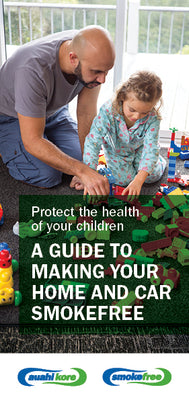Protect the health of your children: A guide to making your home and car smokefree - HE1802

On keeping your home and car smokefree and being a positive role model against smoking. Describes the risks of secondhand smoke, especially to children, as it can increase the likelihood of chest infections and contains many poisons known to cause cancer.
The full resource:
What’s the issue?
Smoking around children and young people is harmful.
Why?
- They will be exposed to secondhand smoke, and children who breathe in secondhand smoke are more likely to develop illnesses such as chest infections, glue ear and asthma.
- Exposure to secondhand smoke increases the risk of sudden unexpected death in infancy (SUDI).
- Young people who have friends and whānau who smoke are more likely to start smoking.
It's illegal to smoke or vape in a vehicle when there are children under the age of 18 present.
Kia auahi kore ō tātou waka
Make your car smokefree
Secondhand smoke
Secondhand smoke contains more than 200 poisons, some of which can cause cancer.
- The concentration of some poisons is higher in secondhand smoke than in the smoke being breathed in by the person smoking.
- The lungs and body weight of children are small so the poisons found in secondhand smoke are more harmful to them.
- Babies and young children may not be able to move away from secondhand smoke.
Secondhand smoke in your home
- Opening a window will not remove all of the poisons.
- The poisons will linger long after the smoke and smell have disappeared.
Kia auahi kore ō tātou whare
Make your home smokefree
Easy steps to making your home and car smokefree
- Make a rule—your home and car are smokefree at all times for everyone.
- Remove all ashtrays from your home.
- Clean out your car ashtray.
- Remove the cigarette lighter from your car.
- Let other people know—put Smokefree | Auahi Kore stickers on your windows.
- Ask your family and whānau to support you by not smoking in your home and car.
Be a positive role model and don’t smoke around children at any time. They’ll be less likely to start smoking.
For further information visit Secondhand smoke | Smokefree.org.nz
If you need support to stop smoking visit Supporting Aotearoa to live and breathe smokefree | Smokefree.org.nz or contact Quitline on 0800 778 778 or text QUIT to 4006